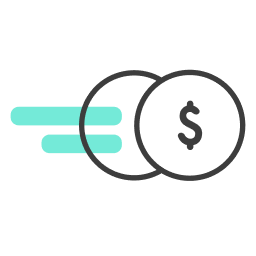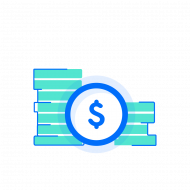How Do I Get A Loan To Start A Business
If you run a startup, you might need financing, either to start or to grow. But unlike with established businesses, you might not qualify for more traditional financing options.
One of the biggest challenges a new small business must face is obtaining the capital necessary to support its initial growth. New employer small businesses are the primary source of U.S. job growth but are much more likely than larger firms to face financial challenges accessing borrowed capital. In order to proudly turn on your physical or metaphorical "open for business" sign, you may need to have access to money in the form of a small business startup loan.
What is a Startup Business Loan?
A business startup loan is financing meant to help with the financial needs of a new business. Startup business loans can go towards things like working capital; the purchase of equipment, machinery, supplies, inventory, and furniture; and the purchase of construction equipment or real estate. New business owners can also consider business credit cards, certain SBA loans, and crowdfunding, among other options.

Get Matched to the Right Loan For Your Business
Let our experts match you to lenders based on your unique business metrics.
Match Now
If you've already started your hunt for a loan, you're well aware that there is a seemingly infinite amount of small business lines of credit and loans out there, available from banks and online lenders. Each one will come with its own set of pros and cons, and perhaps you've discovered that most of the low-cost options are not available to new business owners without a couple of years of business under their belts, strong credit, and/or solid revenues.

Get Matched to the Right Business Credit Card
Business owners who get matched through Nav are 3.5x more likely to get approved for a business credit card.
Get matched
While a bank loan may be your first choice, for the majority of startup businesses, a traditional loan will be out of reach. Banks have strict small business lending standards, and what they offer is often not available to brand new businesses. You may, however, be able to work with your bank to secure equipment financing or other types of business funding if you have a solid business plan in an industry the bank serves. If you are unsuccessful in getting a bank loan for startup costs, there are other lending partners to consider:
How a Startup Business Loan Can Grow Your Small Business
You need to think outside the box when looking for financing for an early-stage business. Although the SBA does offer some financing to startups, you are more likely to find success from other sources. Equipment financing is a good example of this. In situations where you simply need cash, financing (or leasing) the equipment you need allows you to free up cash for those things you can't finance. And, because the equipment is often considered the collateral for the loan, if you have a good personal credit score, it's easier financing to qualify for than a traditional term loan.
With that in mind, here are some examples of startup financing.
1. Equipment Financing
Specifically designed to pay for the purchase of equipment and machinery, equipment loans are similar in structure to conventional loans, with monthly repayment terms over a set period of time. However, the proceeds are used to purchase equipment or machinery.
The lending standards on equipment financing can be less strict because your equipment will be used as collateral for the loan—in other words, if you default, the bank has the right to seize your equipment to cover the cost of their lost money. (Note that some SBA loans may be used to finance equipment. In particular, the SBA 504 loan is helpful for financing larger equipment and real estate purchases.)
Equipment leasing is another option that you should consider. Keep in mind that many different assets you use in your business may be leased, including computers, a pizza oven, or even the furniture in your restaurant.
Both TimePayment and LendSpark offer equipment financing options.
2. Business Credit Cards
While many of us think of credit cards as a safe and convenient way to pay for purchases, they also offer access to an unsecured loan in the form of a line of credit. That means business credit cards can be a great alternative to startup business loans.
They can also help you get off on the right foot separating business and personal finances and establishing business credit . To qualify for a business credit card, issuers will generally look at your personal credit scores and combined income (personal and business). While they may not require collateral, they typically require a personal guarantee. Most business credit cards have the added bonus of great rewards programs and sign-up bonuses.
A good tip would be to choose a card with a 0% introductory rate offer. Doing so allows you to make purchases and carry a balance for 9, 12, or even 15 months without paying interest while you get your business going. In a recent Federal Reserve Small Business Credit survey, 53% of small businesses reported using credit cards to help fund their operations.
3. SBA 7(a) Loans
For the most part, the U.S. Small Business Administration (SBA) doesn't make loans—it guarantees them. Individual lenders are approved by the SBA to make loans under SBA programs, and these generally offer lower interest rates.
There are several different types of SBA loans, and among the most popular is the 7(a) program, which offers loans up to $5 million. If you're wondering if you can get an SBA loan to start a business, keep in mind that in the 2021 fiscal year , 17% of the money lent to small businesses through the 7(a) loan program went to startup businesses.
Getting an SBA loan isn't a super-fast or easy process, though the SBA Express loan program (which generally offers loans of up to $350,000) aims to speed it up somewhat).
There are a number of qualifications required, including acceptable credit. There is no minimum personal credit score required, but for 7(a) loans of $350,000 or less, the SBA requires a minimum FICO SBSS credit score of 155 to avoid a manual credit review. (This commercial credit score can take into account the personal credit of multiple owners along with the business credit of the business. The score ranges from 0-300.)
SBA 7(a) loans for startups are more likely to go to business owners with experience in their industry (a veterinarian opening her own practice, for example) or those purchasing an existing business, including a franchise. Because the terms are favorable, it is a financing option worth exploring.
As mentioned earlier, SBA 504 loans may be helpful for businesses looking to acquire real estate or equipment, while SBA Export Loan programs may be available to businesses that will be participating in international trade. Learn more about SBA loans here .
4. SBA Microloans
SBA microloans are made by approved intermediaries, often community development financial institutions ( CDFIs ) and other non-profit organizations. While the total maximum loan amount is $50,000, the average loan is closer to $14,000. An SBA microloan is a term loan, with a maximum term of 72 months; the average is about 40 months. Funds may be used for working capital or the purchase of inventory or supplies, machinery or equipment, or fixtures and furniture.
5. Other Microlenders
The SBA is not the only microlending option. Microlenders are often non-profit organizations that offer small businesses the opportunity to secure financing in smaller amounts. When it comes to microlenders, be sure to check out these two options:
- Accion: Loans are available from $5,000-$100,000 through Accion's CDFI partners. It tends to be flexible on credit requirements and provides assistance to applicants.
- Kiva: Kiva operates on a largely community-based, trust-driven platform. Small business owners can crowdfund business loans from philanthropic-minded individuals up to $15,000. These loans carry a 0% APR and are provided to struggling entrepreneurs who have proven their character, invited their own network of lenders, were unable to access other financial means, and have a business that has a perceived positive social impact.
6. Invoice Financing
If you get paid by your customers via invoices, invoice financing (which is different from invoice factoring) is a convenient, albeit usually expensive way to avoid cash flow issues caused by long invoice cycles. This is a speedy option—you can get your financing in as little as a day—that requires little paperwork.
Fundbox provides fast access to capital through invoice financing.
7. Crowdfunding
Popular crowdfunding platforms like Kickstarter allow anyone with a vision, including entrepreneurs, to raise money for their project or venture.
There are three main types of crowdfunding that may be available to startups:
- Rewards (e.g. Kickstarter, Indiegogo)
- Debt (e.g. Kiva)
- Equity (e.g. Wefunder)
A business startup seeking capital through crowdfunding will require the business owner to share their business goals and objectives with a large group of people in hopes that multiple people (the crowd) will help fund their request.
These campaigns take lots of marketing effort, but the end reward, should you raise your funds, is startup funding and validation of your business idea by many potential future customers for your business. It's worth noting that equity crowdfunding may be a more accessible funding option than angel funding or venture capital for businesses looking to raise up to $5 million.
8. Line of Credit
Business lines of credit work a little differently than business loans: rather than you getting a lump sum of cash up front, you are approved for a certain amount of capital that you can borrow from at any time.
Pay back what you borrow, and it's available again. Unlike a loan, a line of credit can be open long-term, whereas a loan closes once it's paid off.
9. Short-Term Financing
Another option, especially if you don't qualify for traditional financing, includes short-term loans. These tend to have—you guessed it—short repayment periods, typically of a few months to a couple of years. They may have higher interest rates than other options listed here, but also less stringent requirements to qualify.
10. Personal and Friends/Family Funding
Yes, personal funding is a viable option and is one of the ways many small business owners access capital. But using personal funds or personal loans is a gamble, and you'll need to do a solid job of calculating all of your costs so that you don't run out of money before the business can support itself.
Even if you use personal funds to start, we advise you to start taking steps to establish business credit right away. That way you can start to leverage business credit and access more capital in the future. The business should be able to stand on its own without commingling personal assets and credit. There are a few different options when it comes to personal funding:
- Personal Credit Cards: if you can't secure a business credit card (our preference over a personal card), a personal credit card (or two) with a reasonably high limit can help you get those first few purchases and your business underway. Keep a close eye on your credit utilization and pay your bills on time, because putting business expenses on personal credit cards can hurt your personal credit scores.
- Savings/Home Equity: Dipping into your savings is an even riskier business, but if you have a good amount set aside this could be the cheapest option for you. Borrowing against your home equity is a cheap option but very risky.
- 401K/ IRA Savings: You may be able to withdraw funds from your retirement plans, borrow against a 401(k), or use a ROBS plan to shift retirement funds to your business. Keep in mind that it may not be wise to bet your whole retirement savings on your brand new business.
- Friends and family: Many businesses have been funded with the help of family members. In fact, it's one of the biggest sources of startup capital available to early-stage businesses. Tread carefully, and don't apply pressure, but if they're willing, family can be a good, positive backing for your new venture. (Another way to approach it is to ask them to be the first backers in your crowdfunding campaign.)
Pros and Cons of Small Business Loans
It's important to consider both sides of taking out any kind of financing for your startup.
Pros :
- May help grow business faster
- Can be used to acquire equipment, inventory, retail or warehouse locations, etc.
- Essential for capital intensive businesses
Cons:
- Can be expensive
- Business may fail, and owner may be personally liable for the loan

Get Personalized Startup Funding Matches
When you sign up for a free Nav account, you'll get personalized financing matches. You'll also get free access to your business credit reports and scores.
Sign Up
How Can I Get a Business Loan to Start a Business?
You have the end in mind, but where do you start? A good place to start is with your personal credit scores and business credit score s, which are a measure of the creditworthiness of your business. You can check your business and personal credit scores with Nav. A good credit score can put you in a much better spot than a bad credit score, so be prepared to put in the work if you want to improve your business credit score.
It's also important to look at it your business from the lender's perspective:
- How risky is the type of business you're starting?
- What is your experience or expertise? Your credit history?
- How quickly will the business become profitable?
- If the business were to fail, is there equipment or assets that can be liquidated?
A well-designed business plan can answer many of these questions.
You'll then need to identify which type of startup financing you'd like. Before gathering documentation for your business, you need to know what the lender will be looking for; the application for a microloan will likely be very different than that for a business credit card. Knowing what you can afford for monthly payments can help you best narrow down what financing products you're interested in applying for.
When you've pinned down a loan type and lender, you can then begin to fill out the application. If you've done the legwork ahead of time, this won't take long.
Determining How Much Funding You Need
Start the process by asking yourself, "What do I need the money for?"
Let's call the answer your "loan purpose." Calculate what it will cost to meet your loan purpose and that is the amount to look for. If you can clearly articulate your loan purpose to a lender, your crowdfunding campaign, the SBA, or your uncle Fred, you are more likely to get the money you need as opposed to simply looking for, "As much as I can get." What's more, you'll avoid the financial stress and repercussions of borrowing more than you really need.
How to Qualify for a Startup Business Loan
Qualifying for startup financing may vary from one lender to another, but generally, you can expect a few factors to be considered for eligibility.
First, your credit. Established businesses may have a credit history, but your startup may not. In that case, lenders may look at your personal credit history and scores, so make sure those are up to snuff.
Even if you haven't been in business long, you'll need to demonstrate that you're off to a good start. Have a clearly defined business plan and sales strategy that you can present to lenders if required.
What is Required to Get a Small Business Loan?
Requirements vary significantly by lender, but you should be prepared with the following:
- Updated business plan with details on your growth and marketing strategies
- Personal credit reports and scores from all three major credit bureaus. (The lender will obtain their own copies but it's good for you to check first.)
- Business forecast with details on future cash flow and costs.
- Tax returns and supporting IRS documents for both your business (if available) and personal tax accounts (including personal documents for all owners or registered agents of the business).
- Any applicable licenses and registrations for doing business in your state.
- All financial documents that would be deemed relevant (including bank statements, credit card sales, unpaid invoices, and accounts receivable due to you, if available).
- Any legal contracts that would be relevant (franchise, incorporation, leasing).
- Bank account to deposit the loan proceeds into.
As a startup business, you may not have business credit reports or even business tax returns. In that case, the lender may rely on your personal credit, tax returns and/or a personal financial statement. If, however, you are purchasing an existing business, the lender will likely require information about that business.
Once you've submitted the application, you may have to be patient. Some financing options can be approved in minutes; some may take weeks or even months. Be sure that you're aware of the wait time before you begin the application process. You don't want your urgent business needs to be on hold or miss an obligation waiting for a loan to be approved.
How Do I Get a Startup Business Loan with Bad Credit?
Without at least two years' time in business and strong revenues, lenders will have to rely on your credit scores to help determine their level of risk. A business owner with bad credit will find it tough to qualify for almost any loan. However, many of the microloan and crowdfunding options are worth exploring, as they may be available to business owners with poor credit or no credit, and there are startup business loans with bad credit you may qualify for.

Check Your FICO SBSS Credit Score
With Nav you can monitor your credit score and see what lenders see when applying for financing. You get free access to your business credit reports and scores when you sign up for a free Nav account. Checking won't hurt your credit scores.
Sign Up
Final Word: Startup Business Loans
Running your own business can be difficult, and starting a business might be the toughest part for entrepreneurs. While it can be challenging to find a lender from whom to borrow, don't assume it's impossible to obtain a startup business loan.
Don't be afraid to consider alternative lending options. Nonprofit lenders offering microloan programs may be the right choice for your business, or tapping a business credit card may be a risk worth taking, provided the interest rate is low. Business credit cards for startups can help build good business credit for your business and could help bridge gaps in cash flow if absolutely necessary.
Whatever option you choose to pursue, be prepared and do your research and due diligence when you're looking to borrow. Be realistic with your business and your ability to repay the loan, even if you're approved for a high credit limit.
Above all, keep your motivation for starting the business in mind. It can be a rough process finding and being approved for a startup business loan, but the right motivation and the right business can push through it and get the job done.
This article was originally written on November 13, 2019 and updated on September 13, 2021.
Rate This Article
This article currently has 300 ratings with an average of 4.5 stars.
How Do I Get A Loan To Start A Business
Source: https://www.nav.com/resource/small-business-startup-loans/
Posted by: waferreatim.blogspot.com

0 Response to "How Do I Get A Loan To Start A Business"
Post a Comment